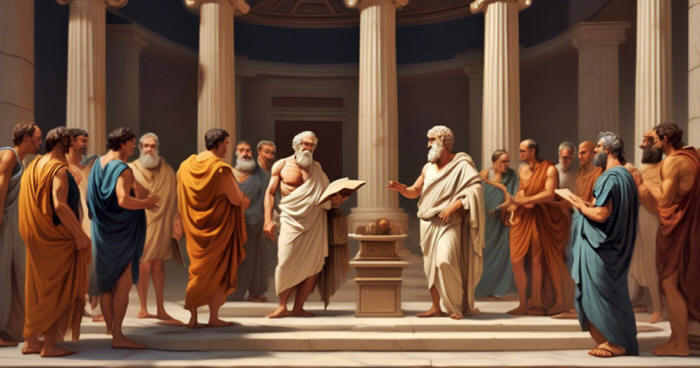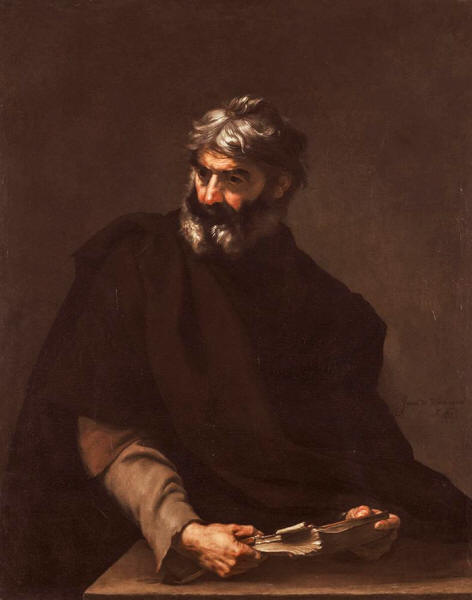|

by Van Bryan
August 01, 2025
from
ClassicalWisdom Website

"There is nothing
either good or bad but thinking makes it so."
So run's a famous line
from Shakespeare's Hamlet.
Even now, it's a startling
concept:
the idea that morality
itself is non-existent, and entirely dependant on
our own minds and perspectives.
Yet the idea itself was
nothing new, even in the Bard's time. And yes, as with a
great many things, it has its roots in the ancients.
More specifically, it comes from ancient Greek
philosophy.
The Sophists were a controversial group of philosophers
who played a key role in the intellectual life of fifth
century Athens.
Socrates himself was a
vocal critic, and even today their ideas remain
influential and even 'dangerous'...
Yet there's no denying that their ideas changed the
world, for good or bad... if either of those things
really exist.
Sean Kelly
Managing Editor
Classical Wisdom |
As
democracy came about in Athens
during the 5th century BCE, the city grew into
prosperity.
With the leadership of Pericles, Athens
ushered in a "Golden Age" of scholarship and culture that would be
marked with several advancements in the area of philosophy,
literature and politics.
During this time there was an established system
of law which, like our modern legal system, guaranteed an individual
his right to trial. Any man brought to court was allowed to plead
his case before a collection of judges who would consider an
appropriate ruling.
And while there was nothing in the way of formal
legal representation, there slowly emerged a group of legal
advocates that, for a fee, would act as advisors to the accused.
It was opportunities such as these that gave
birth to the group known as
the Sophists.
The Sophists were a collection of wandering teachers
that roamed Greece during the late 5th century,
dispensing wisdom and lectures for a fee.
And while many of them would find work as legal
advocates, many others lectured on subjects such as literary
criticism, poetry, and grammar. Still, their chief aim was to
provide training in rhetoric, persuasion, as well as the art of
winning over a crowd.
And while the Sophists were often criticized,
there remained great need for their services.
With the decline of aristocracy and the sudden rise of democracy,
rhetoric became extremely important to those with political
ambition. Politicians like Themistocles, were trained in the art of
rhetoric and persuasion and would gain
lofty political titles because of it.
Public speaking was also important to the average
citizen who always ran the risk of being brought to court where he,
and he alone, would be forced to defend himself with only the power
of his words.
Still, the Sophists are often remembered with
disdain...
Harsh criticisms were brought against them by the
likes of Socrates, Plato and Aristotle.
They were accused, and perhaps rightfully so,
of relying on persuasion and rhetoric to appear wise, without
actually pursuing any form of knowledge.
They could excite a crowd with their eloquent
prose, and persuade their listeners to agree with them, even
when possessing a weaker argument.
All the while they were accepting the coins
of their students, becoming rich from their lectures that often
dispensed untruth.
That isn't to say that all the Sophists were
thieves and con men.
Many of them were men who happened to possess a
particular mind set that had drawn them to sophism.
At the heart of sophism there is a universal
understanding that united them:
it was the belief that all truth is
relative...
It was this singular idea that possessed the
Sophists. Many of them used it as validation for making weaker
arguments strong, while collecting a fee all the while.
Others saw the philosophical implications of such
an idea.
"If you are ignorant of [what a Sophist
really is], you cannot know to whom you are entrusting your soul
- whether it is to something good or to something evil."
Plato (Protagoras)
One of the most prominent of the Sophists was
Protagoras.

Protagoras
by Jusepe de Ribera,
1637
Born in Abdera, in northeast Greece.
He would spend much of his life traveling,
lecturing to anyone who could afford him. He would eventually travel
to Athens and become the advisor to the ruler Pericles.
A man who was a self proclaimed sophist,
Protagoras would put forth several ideas that expanded on the
loose doctrine of sophism. These ideas would expand to all areas
of human nature and would partially be supported by later
anthropological studies.
Although he admits to being a Sophist, Protagoras
is often remembered more as a pre-Socratic philosopher who
gave us the rather bold idea that,
man is the measure of all things...
As mentioned before, the Sophists rejected the
idea of objective truth.
Protagoras expanded on this and began examining
the essence of human nature and how it would relate to such abstract
notions such as justice, virtue and wisdom.
Having little to no interest in philosophical
speculation about the substance of the cosmos or the existence of
gods, Protagoras placed humans at the forefront of his philosophical
inquest.
By observing the Sophists arguing amongst each other, each
possessing different arguments yet each believing themselves to be
correct, Protagoras concluded that truth was very much a
matter of opinion.
The worth or value of an idea is determined
entirely by the person that holds it.
There exists no universal measure with which we
can compare ideas and accurately determine their worth, ideas and
their value are of a subjective nature, changing just as quickly as
a man changes his mind.
This might seem rather obvious when we take the time to reminisce
about ideas that we once held in such high regard.
As a child you undoubtedly thought it was a
good idea to stay up late, watch television and eat copious
amounts of candy. These ideas, at the time, were of great worth
to you; they were regarded very highly.
Yet, we all grow older and these ideas that we once held in high
regard are often eclipsed by our changing attitudes.
Political alliances, attitudes about love, as
well as commitment to a career are all aspects of ourselves that
undoubtedly change over the course of our lives.
And in this way we witness the subjectivity of
knowledge, the ever changing landscape of truth.
"No intelligent man believes that anybody
ever willingly errs or willingly does base and evil deeds; they
are well aware that all who do base and evil things to them
unwillingly."
Plato (Protagoras)
There are some rather important implications to
this idea of relativism.
If knowledge and truth are subjective, then
that would seem to suggest that ethical and moral behavior is
also relative...
And Protagoras again took this leap.
The philosopher believed that nothing was
inherently good or bad.
Something is only ethical or right
if a person or society judges it to be so.
Actions such as murder, theft,
even rape are immoral actions simply because our society
judges it to be so.
And if we take the time to deeply consider
this idea, we are cast into a very dark place
where all good and evil becomes equally
accessible, morally defensible if you have the right, or wrong,
mindset.
Socrates spent much of his life navigating
the philosophical terrain of objective ethical notions.
To Socrates, ideas such as justice
and virtue were not just passing considerations that
were reconfigured to meet one's preference. They were ideals that
existed eternally and without question or compromise.
Socrates sought to find these answers throughout
his life. And certainly there are some valid arguments against
Protagoras' ideas.
For instance,
mathematical properties should exist
eternally, regardless of the ideas of man.
Protagoras dismisses this, concluding that
mathematical principles do not necessarily exist in nature and
are therefore abstract ideas which need not concern us.
I can only assume that Pythagoras promptly
rolled over in his grave.
The confrontation between the philosophical ideas of Protagoras
and Socrates came to a head in Plato's
Protagoras,
a dialogue where Socrates and Protagoras, now
an old man, face each other to discuss the nature of virtue.
Protagoras, true to form, makes a very long,
very dramatic speech where he recounts the creation of man by
Prometheus.
Protagoras takes the stance that virtue can be taught, and that
the Sophists are doing a public service by educating the youth.
Socrates, of course, engages in a debate with
short, precise questions that he hopes will prove his own point.
The two philosophers eventually concede to
each other, complementing each other on their wisdom.
Yet, it would appear that Protagoras has won in a
subtle way...
Each man still holds different truths that are
validated by their own beliefs.
When Protagoras states that "man is the measure of all things" he
concludes that all knowledge, virtue, or wisdom
is determined by the the man or society that holds those beliefs.
On a warm summer day in Athens, a man from
Sweden will visit and comment that the climate is hot.
A man from Egypt will visit and comment that
it is so cold.
And yet, both of them are right.
This type of thinking was common within the legal
and political system of ancient Greece.
Our modern legal system similarly deals in
compromise, exceptions and reasonable doubts.
There are no absolutes.
The conclusion that Protagoras, as well as the
Sophists, drew was that there is nothing that is either right or
wrong, but thinking it will make it so.
There exists only man and the judgments that we
cast on ourselves...
|



